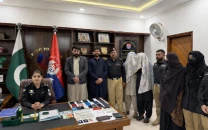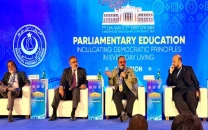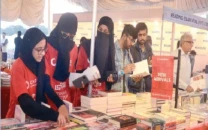Pulling the right strings
Your baby may not have spoken her first word yet but (s)he might be ready for music classes.

On Sunday, cooing, sighing whispers filled the auditorium at a hotel as a group of four to 10-year-olds sang the raag aiman, one of the simplest raags sung to the saat surs of music.
The muted appreciation came not just because the audience was made up of parents. There was something remarkable about the simple sight of earnest little children playing the Rabat, a string instrument popular in South Asia.
“Music brings out the best in people,” said Sami Mustafa at the open house of the NEEMTREE Music School. Mustafa, the director of the school, said that their aim is to introduce the aesthetics of music to children. “It’s [also] a very good way to keep the community busy,” he added.
The school is launching music classes for children aged between six months to 12 years. Classes are designed to introduce children to the magic of sound and music, the wonder of making and playing instruments, the joy of singing and dancing and the elation of rhythm and movement. This can be the foundation for a lifelong appreciation and enjoyment of music or even for a more formal study, explained the school administration.
The academic year that is divided into two modules will have two semesters and a summer term. Classes will be arranged twice a week so that day school is not affected.
Children in primary school will be able to play the drum, guitar, harmonium, piano, tabla and violin. They will be taught to sing as well.
Teaching will involve activities such as colouring to the beat of music, story telling and acting out songs, Mustafa told parents at the open house, explaining that activities will depend on the student’s age.
The image of their little ones strumming guitars and tinkering at pianos was charming enough to mesmerise parents. Even more attractive is the prospect that NEEMTREE offers an activity that will keep the little ones busy. And to top it off, music study helps with confidence.
Shamila, who will be sending her five-year-old son to these classes, said that there is no permanent extracurricular activity in the city for children. “This way he will learn to play, be more confident and be socially active,” she added.
Not all parents will find the music school to be a culturally and religiously viable idea, admitted Shamila, but for her, such an activity carries weight as a tool for reaching out to children and teaching them to become more secure.
“Me and her [my wife] are fasting, but we’re still here,” Shamila’s husband added, trying to explain how a music school did not have to be against one’s religious values.
While Jacqueline’s one-and-a-half year old has shown no inclination to play an instrument, the boy feels attracted to any music he hears, encouraging his mother to take an interest in the school. “Music tends to bring a person together, to make you complete in a way and that is why I will be sending my child here,” she said. And while she too thinks that there are times when music tends to be frowned upon, “sometimes you have to move out of that boundary for the sake of knowledge”.
Saleem, who has been a drummer himself, said that he will be sending his daughters to the school as well. “Music has a humanising factor that I want my daughters to experience,” he said. He and his wife Sameera are the kind of parents who believe in exposure and variety for their children, he added.
Music is very much our culture, feels Huma Naz, who will be teaching kathak at the school. Naz trained in India and belongs to the kathak gharana of Jaipur. For her, there is nothing about music that needs to be ‘frowned upon’ by society or culture.
“If you go back to Moen jo Daro, the Harappa or Gandhara civilizations, you will see this,” she said. “Why are we not aware of our culture?” she asked, adding that in Pakistan people are only exposed to dance and music when they are in their teens or 20s. She feels that the school will play an important role in acquainting young children with this aspect of their culture.
Another teacher, Joshinder Chaggar, who has taught dance at the National Academy for Performing Arts, Karachi, agrees that learning music and dance at a young age is quite important. It also speeds up the learning process for them. For older people who have never been exposed to dance in their childhood, it takes a year and a half to just understand their bodies.
Talking to The Express Tribune, Rakshee Niazi, the assistant director, said that there are two things that are intrinsic to a growing child: love for play and love for music.
The school, which will begin classes September 15 this year, is going to be the first of its kind for children in the country, said Niazi.
Published in The Express Tribune, August 16th, 2010.



















COMMENTS
Comments are moderated and generally will be posted if they are on-topic and not abusive.
For more information, please see our Comments FAQ